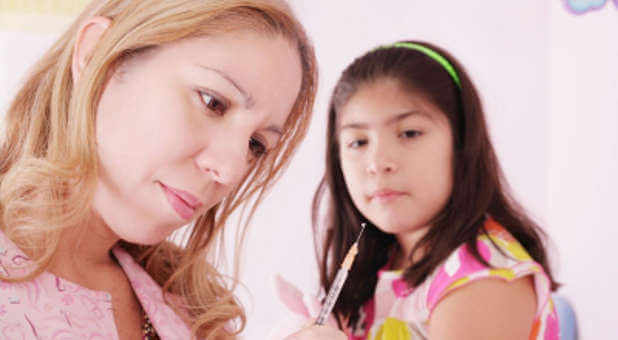The people and information sources parents surround themselves with may influence their choice to vaccinate their children or not, according to a survey from one county in Washington state.
Of almost 200 parents who took the survey, almost all said they had groups of people offering advice on vaccination, but those who chose not to fully vaccinate their children were more likely to have larger social groups and to turn to other sources, such as books, pamphlets and the Internet, for guidance.
“The take-home message from this is that the social networks for the majority of parents are extremely important in affecting vaccination decisions,” said Emily Brunson, the study’s author from Texas State University in San Marcos.
“Especially the people in the parents’ networks suggesting nonconformity is greater than anything else—including the parents’ own beliefs on vaccination,” she added.
The U.S. Centers for Disease Control and Prevention (CDC) recommends young children under the age of six years old get a series of shots that protect against 14 preventable diseases, including chickenpox, measles and whooping cough.
The latest report on vaccination rates from the CDC shows 95 percent of kindergarten-aged children receive their vaccinations, but many children still receive their shots late (see Reuters story of August 23, 2012 here: reut.rs/YimdGn and Reuters Health story of January 21, 2013 here: reut.rs/YimPvG).
The fear is that parents who don’t vaccinate or who delay vaccinating their children put their own kids as well as others at risk for developing preventable disease, such as whooping cough.
Last year the U.S. experienced one of the largest whooping cough outbreaks in half a century, which health officials attributed both to vaccines wearing off and to parents simply skipping the pertussis vaccinations for their children (see Reuters story of July 20, 2012 here: reut.rs/Yina1x).
For the new study, Brunson surveyed parents to see what impact a person’s social group and information sources had on their decision to vaccinate their children.
The people who took the survey were recruited from around King County, Washington, which includes the city of Seattle, and were U.S.-born, first-time parents with children younger than 18 months old.
Overall, 126 “conformers” – people who vaccinated their children according to the recommended schedule, and 70 “nonconformers”—people who didn’t stick to the schedule – took the survey between March and July 2010.
Of those 70 “nonconformers,” 28 were getting their children all the recommended shots, but not on time. Another 37 were only partially vaccinating their children and five were not vaccinating their children at all.
About 95 percent of all parents reported having a group of people offering advice on vaccination, but “nonconformers” tended to have larger groups of people to tap for information than “conformers.”
“Nonconformers” typically reported about seven people who gave them advice, compared to about five people in “conformer’s” social groups.
The people included in those groups were similar among the two types of parents. Spouses and partners were usually the most important advisers, followed by doctors, family and then friends.
Typically, “nonconformers’“ groups included about 72 percent of people who recommended against vaccination in some way. That compared to 13 percent among “conformers.”
“Nonconformers” were also more likely to seek outside sources, such as books, news programs and the Internet. Compared to 80 percent of “conformers” who said they used those outside sources, all “nonconformers” said they did.
Brunson writes in the journal Pediatrics that her findings show healthcare providers are only a part of parents’ social networks.
She adds that it’s essential for programs trying to increase vaccination rates to also focus on “communities more broadly so that the other people parents are likely to consult … are also included.”
Dr. Joseph Anthony Bocchini, Jr., chairman of Pediatrics Medicine at Louisiana State University Health Sciences Center in Shreveport, said the new study adds additional information by using a social network approach for the first time to understand parents’ decisions about vaccinating their children.
“I think that what needs to be done is that everybody needs to understand the importance of vaccines. And they’re not only important for the people who receive them but they’re also important for the community,” said Bocchini, who was not involved in the new research.
He said that in addition to doctors, the American Academy of Pediatrics and the CDC have valuable information on their websites about vaccinations for children.
© 2013 Thomson Reuters. All rights reserved.












